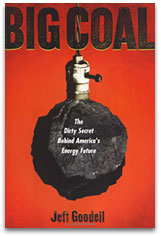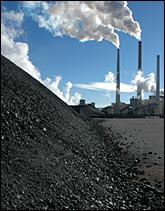In 2001, around the time Dick Cheney’s secret-recipe energy plan made its debut, Jeff Goodell went to West Virginia to report on coal’s rising fortunes. He’d been sent to do a story for The New York Times Magazine, but the material spilled over into a book, Big Coal: The Dirty Secret Behind America’s Energy Future, published this summer. It’s a journey from the mines of Wyoming, across the plains by rail car, into the belly of the turbines in the east, and all the way to China, following the tale of the black rock that still, after all these years, afflicts and enables us.

Jeff Goodell.
Courtesy Houghton Mifflin.
As the fossil fuel that isn’t running out, coal’s been rebranded as a means to achieve energy independence. With the assistance of a friendly administration in the U.S. and burgeoning demand from China and India, the industry looks set to build hundreds of coal-fired power plants in coming years. And despite the gasification/sequestration PR, the momentum is strongly behind old-school plants that laden the air with particulates and mercury and the atmosphere with greenhouse gases.
Goodell recently visited Grist HQ for a leisurely chat about coal’s past, present, and unsettling future. Here follow highlights; for the unabridged transcript, see here.
In your book, you mention Americans’ ignorance about where electricity comes from.
Everyone I talk to can tell me the price of a gallon of gas to the tenth of a cent, but I’ve not found a person — except for one guy at a reading last night who had a solar panel — who could tell me what they pay for a kilowatt of electricity. We’re completely divorced from the price.
Why is coal having a comeback? The friendly administration doesn’t hurt, but things started before that, right?
Right. We’ve been burning coal for a long time. Coal never really went out of fashion. But in the ’70s, the future was not looking good — you had the environmental movement beginning, the Clean Air Act, and nuclear power ramped up. This is before Three Mile Island. Then, the future was seen as gas and alternatives. Even then, during the energy crisis in the ’70s, people were messing around with solar panels and all that kind of stuff.

Big Coal: The Dirty
Secret Behind America’s
Energy Future, by Jeff
Goodell.
Coal was seen even then as inefficient, old, dirty. There may have been one or two coal plants built in America between, say, 1975 and 2001, but I’m not aware of very many. The basic idea was that the plants that were left, from the ’60s and ’70s, were going to rust away, and the bright new future was going to come.
A number of things made it clear that that was not going to happen: the Bush administration, most clearly, but also high gas prices, the fact that renewables weren’t scaling up quickly, and the mentality of the electric-power industry — an industry that does not embrace change very easily. It’s always the easiest thing to do, to keep doing what you’ve been doing. And coal is what we’ve been doing for a long time.
Coal boosters say we have 250 years worth of coal to burn in this country. You argue that’s misleading. Why do you think that figure is inflated?
It is based on old studies that haven’t been updated since the ’70s. Those studies themselves were based on studies from the ’20s and ’30s.
It’s not mysterious where coal is. It doesn’t pool underground; it doesn’t move around. It’s a sedimentary rock. The problem with that number — 250 years, or 270 billion tons — is that it doesn’t take into account where it is and what it will take in environmental and economic terms to get it out of the ground. Vast coal reserves are buried under towns, under state parks, under forests. We’ve been mining coal for 150 years. We start with the easy stuff, and it gets harder and harder to get out. The coal they’re going after now, even in the Powder River Basin [in Montana and Wyoming] where there’s lots and lots of coal, is getting deeper and deeper. It’s more deeply buried in Appalachia, requires more destructive technologies, like mountaintop-removal mining. Underground mines are going into coal that was considered off-limits before because it was too difficult or dangerous to get at.
How do coal companies retain such a grip on the very people who have suffered most at their hands?
It goes to the very heart of the development of Appalachia. The coal barons came in and bought up the mineral rights for nothing in the 1850s and 1860s. There’s never been any other economic model there. Coal’s been big daddy there for a long, long time.

Blowing smoke.
Photo: iStockphoto.
Much has been written about the early days, in the 19th and early 20th century, with company towns and the almost indentured servitude the coal industry required. They worked explicitly to keep other industries out in the early days of the coal industry. Although the company stores are gone, that mentality still exists there. There really is no alternative for a lot of people in coal country. You either work for the coal industry or you leave, you suffer total poverty. I was just [in Appalachia] a few weeks ago, and there is a sort of Stockholm syndrome.
Is there a cultural element to it? A little bit of red-state resentment toward blue-state elitism?
There is — and justifiably. “We’re wrecking our mountains; our people are dying for you fat cats to sit around on your butts and surf the internet. You live in a world powered by coal and you don’t see at all the costs of it, but we, here in West Virginia or Kentucky, pay for it with our blood. Who are you to come down here and criticize us?” There is a big dose of that. And it’s right, actually. We do take it completely for granted. We do burn their blood on that coal.
One of the things that attracted me to this book was how much I liked the people in West Virginia. They’re the toughest, strongest, most independent people I’ve ever met. They’re remarkable characters.
I was there a couple weeks ago. It’s volatile there right now. A lot of people have decided enough is enough. People like Judy Bonds, who’s head of Coal River Mountain Watch, a small but high-profile group. She won a Goldman Prize for environmentalism in 2003. She’s an old coal-miner’s wife, eighth generation West Virginian — you don’t want to mess with her.
It’s cliché at this point that the Bush administration is in coal’s pocket. Cite some of the most egregious examples.
A short list would include the appointment of David Lauriski as head of the Mine Safety and Health Administration, and his cutting back on mine safety inspectors, changing the agency from an enforcement agency to a “safety compliance” agency. They’re not mine inspectors anymore, but “compliance assistance officers.” Then [Lauriski] resigns in a scandal over awarding favorable contracts to his buddies.
The rollback of new-source review is an incredibly complex nightmare, but essentially the point is: these big dirty coal plants were meant to have controls on them years ago and don’t, and the administration waged a subtle but effective campaign to undercut the lawsuits against them.
Mercury: studied for years. National Academy of Sciences studied it, EPA decides what they want to do, Bush administration comes in and the whole thing goes into this cap-and-trade idea.
Of course, the big one was the CO2 reversal. That was just shameless.
Most people would pin the campaign of misinformation around global warming on the oil industry. But coal’s had a role to play as well.
Coal has fought against it from the very beginning. The Greening Earth Society [– funded by the coal industry –] is a classic example an astroturf campaign set up to make us think that global warming is good, that it will make the earth more bountiful and the beaches warmer and nicer and everybody’ll have a better suntan.
It’s clear that the coal industry has always viewed global warming as a game ender. They know — or at least they’ve always believed this, I don’t think it’s true — that if we take global warming seriously, they’re in deep trouble. Mercury, clean-air stuff, they can deal with all that. They don’t want to — it’s just a question of money, a question of time. They have long viewed global warming as: they’re out of business. It’s partly a product of their paranoia, partly a product of the fact that they feel beaten up by the environmentalists, and partly ignorance.
When I was in Gillette, Wyo., in 2004 I sat down with the CEO of one of the biggest coal companies in America. We were talking about global warming. I asked him if he talks to his kids about global warming. He said, yeah, I do, I make sure they wear hats when they’re out in the sun. I’m like, what do you mean? And he said, well, the hole in the ozone, I don’t want them to get skin cancer. This is what you’re concerned about?
There’s a profound and willful ignorance on the industry’s part. It’s hurt them. I don’t think global warming is necessarily a game ender for coal, but the fact that they’ve dragged their feet on it so much just makes the challenge all the harder for them.
Do you get a sense in China of the cultural associations of coal?
In America, you can live a long life and never know anything about coal. Over there, it’s everywhere. You trip on it when you get off the airplane. It’s piled up in doorways. It’s a very frank part of life.
But the Chinese have an incredibly practical view of it that we don’t have. They say, yes, we’re building a lot of coal plants, yes, we’re burning a lot of coal, but we have 700 million people in poverty here, and you’re expecting us to pay 12 times the price to put up solar panels everywhere when you guys, the richest nation in the world, won’t do it? They see themselves as taking exactly the path to development we did — and they’re going at it incredibly quickly. They see coal as a tool to help them build a prosperous nation, one they will then get rid of and go on to something else. They see the opportunity for clean, green technology better than we do, because in a way it’s more in their face.
I talked to a lot of people in China about global warming and I never heard any denial. Everyone knows what’s going on. It’s very frank, and it was refreshing in that way.
But if China really does build the hundreds of dirty coal plants they’re planning, the game’s up — there’s no way to avoid catastrophic climatic consequences. You don’t want to consign them to poverty, but you don’t want to consign the rest of the world to catastrophe …
I have an 8-year-old daughter. She understands very clearly that if she messes up her room, she needs to clean it up. We, the West, are the ones who have dumped all this shit into the atmosphere that’s causing the problems now. We are the richest nations in the world. The environmental movement shies away from the morality of this. I have friends in the movement who say, “We can’t talk about morality. We can’t tell people what to do.” But I get a little bit tired when people ask me, as they always do, “If we’re not going to burn coal, what are we going to do? What are we going to replace it with? Is it nuclear? Is it solar? Is it wind?”
When I was working on this book, I spent some time looking at the slavery debate. During the slavery debate there was all this stuff: “Oh, you can’t abolish slavery, the farms will collapse. What are you going to replace this labor with? We don’t have people — who’s going to pick our cotton? Everything’s going to fall apart.” The great thing Lincoln said is, that’s not the issue. The issue is, is it right or is it wrong? You make that decision first and then you decide how to do it. Global warming is reaching that moment.
If you had to predict, do you think that in 50 years, 100 years, we’ll still be burning coal?
It depends upon the industry itself. If the industry continues to be this empire of denial, if it resists change, if it doesn’t rush to embrace a sustainable path — which means not dangling FutureGen, but building some [coal-gasification] plants, really moving forward — it’s got a limited future. If it does move in a creative way, respond to what’s going on now, there is a path to the future for it.
But in the long run, it’s obvious to me, and to everyone, that coal is a very inefficient way of getting energy, even in the best-case scenario. Best-case scenario, it is a bridge to some other breakthrough, some cleaner, greener technology.
There’s plenty more where this came from. Check out the unabridged interview transcript.


